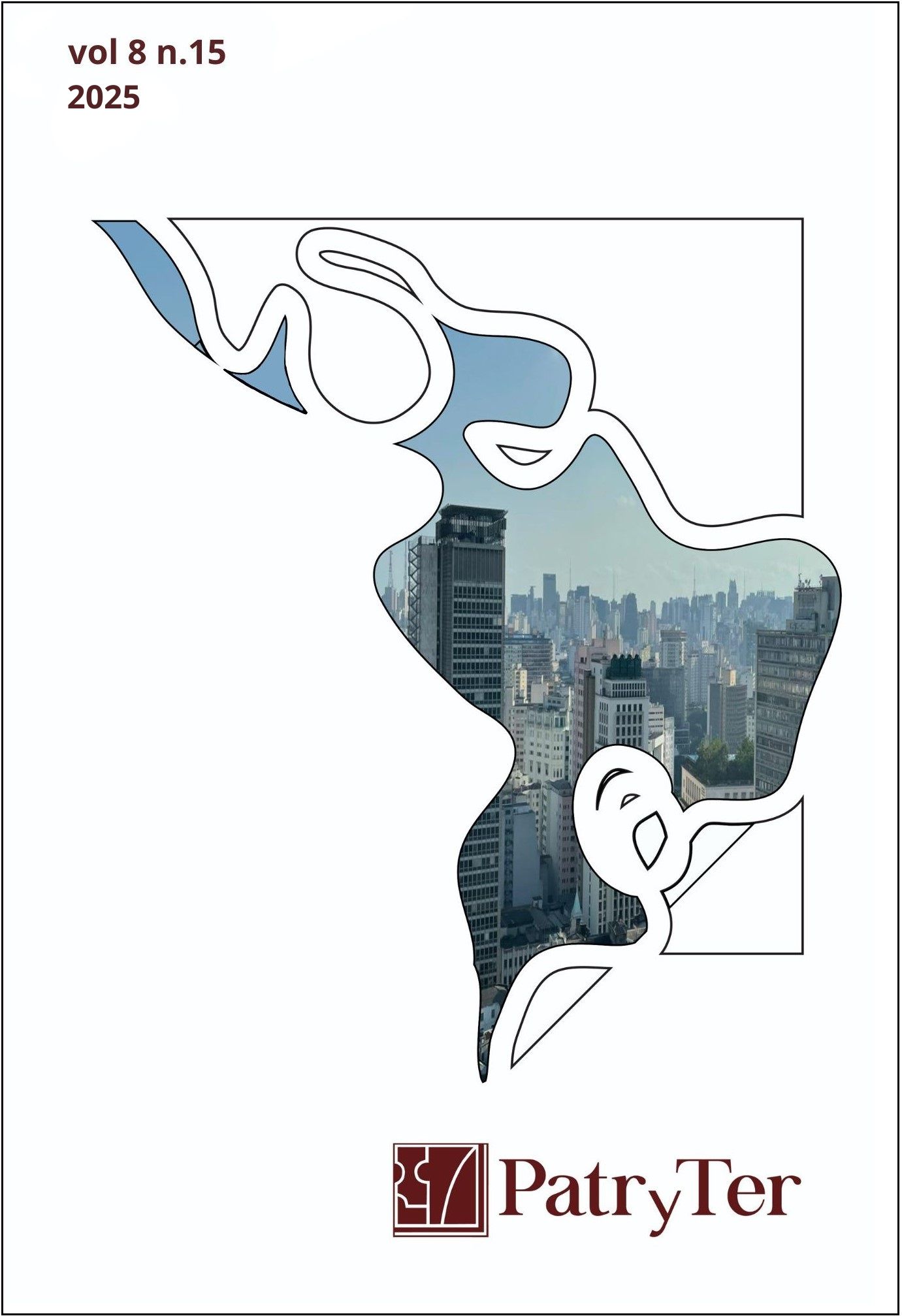Notes on the IV CLUP - Latin American Colloquium on Urbanization and Patrimonialization, Argentina
DOI:
https://doi.org/10.26512/patryter.v8i15.55935Keywords:
CLUP; GECIPA; Latin America; Bahia Blanca; ArgentinaAbstract
The CLUP – Latin American Colloquium on Urbanization and Patrimonialization – is a biennial academic event that brings together researchers in Geography, human and social sciences from Latin America and the Caribbean, a favorable space for the dissemination of topics and theoretical-methodological debate related to land uses, urban-rural dynamics, and the socialization of the natural environment on the continent. The event is promoted by GECIPA (CNPq Research Group on Cities and Patrimonialization in Latin America and the Caribbean), which belongs to the Department of Geography of the University of Brasilia (UnB) and was founded in 2011, under the coordination of Professor Everaldo Batista da Costa. The IV was held at the National University of the South, between September 26 and 28, 2024, bringing together about 130 researchers from universities and other institutions in Brazil, Mexico, Chile, Argentina and Costa Rica. The event featured a total of 13 panels, in which 78 papers were presented, which allowed for reflection and proposals for possible paths for the construction of socio-spatial justice and for the criticism and confrontation of socio-spatial inequalities, which involve rural cities in Latin America and the Caribbean.
Downloads
References
Andrade, A. (2021). Estudos em Geografia Histórica e seu vínculo ao patrimônio-territorial. PatryTer, 4(7), 63–77. https://doi.org/10.26512/patryter.v4i7.27062
Costa, E. & Moncada, J. (2021). Decolonialidad originaria latinoamericana y condicionamiento barroco del territorio novo hispano: conventos, presidios y pueblos de indios. Cuadernos de Geografía: Revista Colombiana de Geografía, 30(1), 3-24. https://doi.org/10.15446/rcdg.v30n1.80924
Costa, E. (2016). Utopismos patrimoniais pela América Latina: resistências à colonialidade do poder. In Actas XIV Colóquio Internacional de Geocrítica (pp. 1-32). Barcelona, Espanha: Universidad de Barcelona. http://www.ub.edu/geocrit/xiv_everaldocosta.pdf
Costa, E. (2021). Patrimonio-territorial y territorio de excepción en América Latina, conceptos decoloniales y praxis. Revista Geográfica Venezolana, 62(1), 109-127. https://doi.org/10.53766/RGV/2021.62.01.05
Costa, E. (2024). Del patrimonio territorial eurocentrado al patrimonio-territorial decolonial. Giro epistémico desde el Sur. Eutopía. Revista De Desarrollo Económico Territorial, (25), 11–32. https://revistas.flacsoandes.edu.ec/eutopia/article/view/6175
Costa, E., Rodríguez, D. & Alvarado, I. (2022). Circuitos de la economía urbana y patrimonio- territorial latinoamericano. Mercado de Xochimilco, Ciudad de México. Urbano, 25(46), 90– 105. https://doi.org/10.22320/07183607.2022.25.46.08
Dussel, E. (1993). 1942 – O encobrimento do outro: a origem do “mito da Modernidade”. Petrópolis: Vozes.
Grosfoguel, R. (2012). Para descolonizar os estudos de economia política e os estudos pós-coloniais: Transmodernidade, pensamento de fronteira e colonialidade global. Periferia, 1(2), 41-91. https://doi.org/10.12957/periferia.2009.3428
Mignolo, W. (2017). Colonialidade: o lado mais escuro da modernidade. Revista Brasileira de Ciências Sociais, 32(94), 1-18. https://doi.org/10.17666/329402/2017
Carvalho, U. (2024). O patrimônio-territorial rural-urbano de Serro-MG no contexto da formação socioespacial brasileira (Tese de Doutorado em Geografia). Universidade Federal do Rio Grande do Sul, Porto Alegre.
Queiroz, P. (2021). Patrimônio-territorial indígena na urbanização de Brasília e no Santuário Sagrado dos Pajés: contexto latino-americano (Dissertação de mestrado em Geografia). Universidade de Brasília, Brasília.
Quijano, A. (2005). Colonialidade do poder, eurocentrismo e América Latina. CLACSO.
Santos, M. (1994). O retorno do território. Anpur/Hucitec.
Santos, M. ([1975] 2004). O espaço dividido. São Paulo: EDUSP.
Walsh, C. (2009). Interculturalidad, Estado, sociedad: luchas (des)coloniales en nuestra época. Quito, Universidad Andina Simon Bolívar e Abya-Yala.
Downloads
Published
How to Cite
Issue
Section
License
Copyright (c) 2024 PatryTer

This work is licensed under a Creative Commons Attribution-NonCommercial-NoDerivatives 4.0 International License.
Please be advised that Revista Patryter is licensed under a Creative Commons Attribution-NonCommercial-NoDerivatives 4.0 International License (CC BY-NC-ND 4.0) https://creativecommons.org/licenses/by-nc-nd/4.0/deed.en
Authors who publish in the PatryTer Magazine agree to the following terms:
- Authors retain the copyright and grant the journal the right of first publication, the work being simultaneously licensed under the Creative Commons Attribution-NonCommercial-NoDerivatives 4.0 International License (CC BY-NC-ND 4.0) which allows the sharing of the work with recognition of the authorship of the work and initial publication in this journal.
- The contribution is original and unpublished and is not being evaluated for publication by another journal. When submitting the article, authors should attach as a supplementary document a Letter addressed to the PatryTer's Editor, indicating the academic merits of the submitted work (relevance, originality and origin of the article, that is, from what type of research]. This letter must be signed by all authors.
- The authors authorize PatryTer Journal to publish the article in public and private databases, in Brazil and abroad.
- Authors declare that they are fully responsible for the entire contents of the contribution that they submit to the Editorial Board of PatryTer Magazine.
- Authors declare that there is no conflict of interest that could interfere in the impartiality of the scientific papers submitted to the PatryTer Magazine Editorial Board.
- Authors are authorized to take additional contracts separately, for non-exclusive distribution of the version of the work published in this journal (eg publish in institutional repository or as a book chapter), with acknowledgment of authorship and initial publication in this journal.
Authors are allowed and encouraged to publish and distribute their work online (eg in institutional repositories or on their personal page) at any point before or during the editorial process, as this can generate productive changes as well as increase the impact and the citation of the published work (See The Effect of Free Access).



